Key findings of the African Governance Report – Agendas 2063 & 2030: Is Africa on Track?
16 October, 2019
Without data, we drive blind – policies are misdirected and progress on the road to development is stunted. We must all act urgently to close the ‘data gap’, if indeed we aim to leave no one behind.
-Mo Ibrahim
Africa is halfway through the First Ten-year Implementation Plan (FTYIP) (2014-2023) of the African Union’s (AU’s) Agenda 2063, and about to enter the last ten years of the United Nations (UN’s) Agenda 2030 and the completion of its Sustainable Development Goals (SDGs). These frameworks contain many overlapping themes, and key to effective implementation is the capacity to monitor progress in order to adapt resources and policies as soon as needed.
Strengthening Africa’s fragmented data landscape is vital for meeting these development targets. This is the core message of the Foundation’s recently published African Governance Report, which outlines the common elements of the Agendas and their relationship with public governance in Africa. This report draws on data from the Ibrahim Index of African Governance (IIAG) to share insights into progress, analyse the measurability of the Agendas, data availability, and provide a high-level overview of the state of statistical capacity in African countries.
Agendas 2063 & 2030 and public governance in Africa
Whilst different in size and scope, both Agendas 2063 and 2030 and its SDGs, are citizen-centred and focus on the delivery of public goods and services. Agenda 2063 is a pan-African vision for a 50-year transformation of the continent with a distinctive focus on democracy, cultural identity and continental integration. Whereas the SDGs reflect an economic, social and environmental 15-year agenda with a strong emphasis on climate change related issues and inequalities.
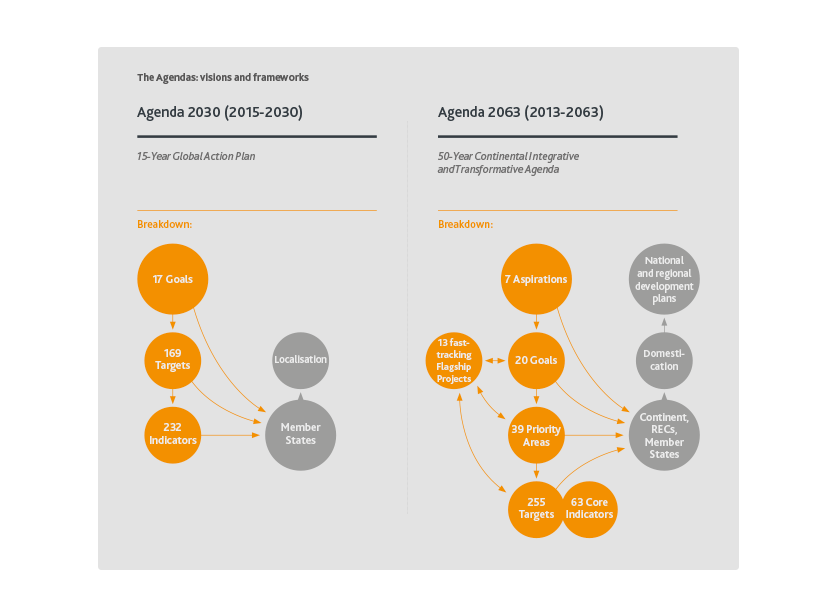
There are however strong thematic overlaps in the Agendas, outlined in the report, which also highlights the complexity and challenges for Africa related to their monitoring processes, which still lack some clarity.
Governance is key to assessing the implementation of both Agendas. Governments have a unique and central role to play in achieving both. The Foundation defines governance as the provision of the political, social and economic public goods and services that every citizen has the right to expect from their state, and that a state has the responsibility to deliver to its citizens. This is how governance is assessed in the IIAG and as a result, it presents strong overlaps with the core focuses of both Agendas – from health to education, to women and youth inclusion, to accountable institutions and economic prosperity.
85.7% of Agenda 2063 Aspirations (6 out of 7) and 70% of its Goals (14 out of 20) are linked to IIAG governance measures. For Agenda 2030, 70.6% of the SDGs (12 out of 17) are linked to IIAG measures. There is also a strong correlation between IIAG Overall Governance scores and the Africa SDG Index overall scores.
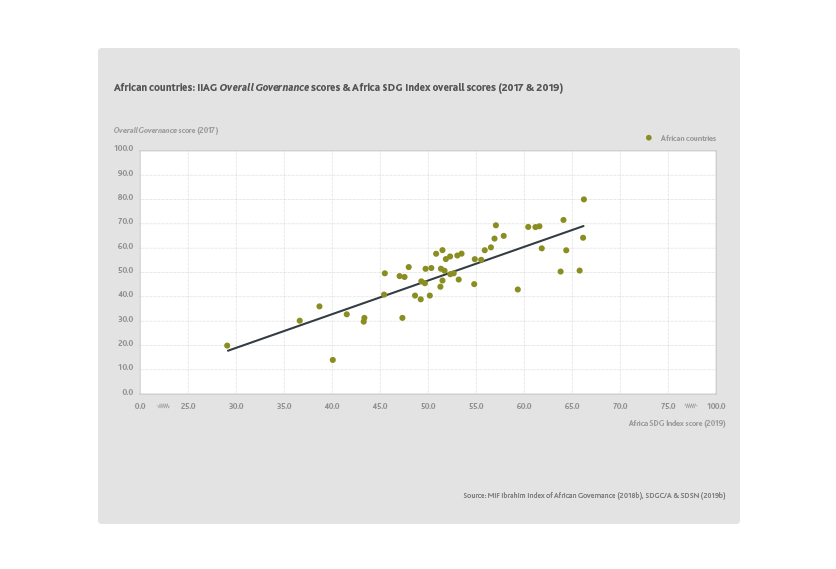
All of this underscores the centrality of governance to the Agendas, and the importance of the IIAG, the most comprehensive dataset on African governance, as a key tool to assess country readiness and progress for the implementation of both Agendas.
Assessing Africa’s readiness for both Agendas
The report identifies five core overlapping themes between all three frameworks, which are: access to and quality of education, health and nutrition, women and youth inclusion, prosperity and economic opportunity, and security, justice and strong institutions. The following are the top-level findings for some of these themes, since 2014, when the implementation of Agenda 2063’s FTYIP started.
Access to and quality of education
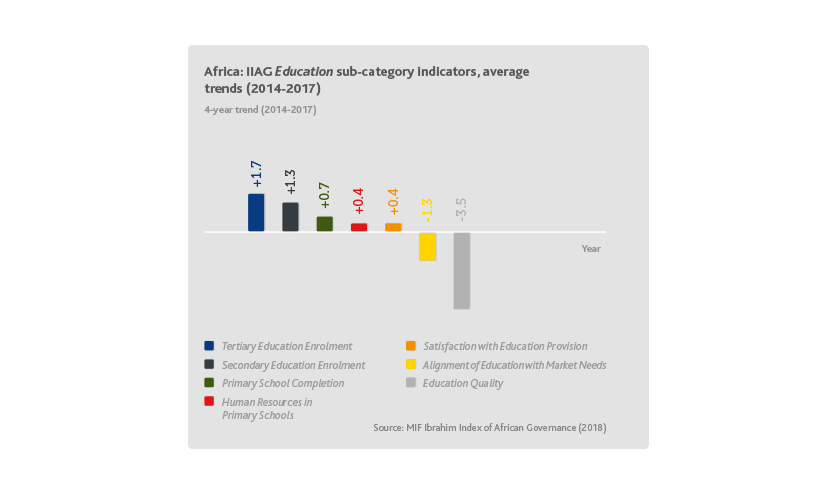
Countries have, on average, regressed in delivering high quality education, training, research and development, and in matching education to the needs of a competitive economy. In this sense, the respective indicators Education Quality and Alignment of Education with Market Needs are the only ones to decline in the IIAG Education sub-category. The latter issue can be advanced if governments and partners take a closer look at prioritising active engagement with the private sector, to assess the requirements of the job market.
Health and nutrition
Africa has made great progress in antiretroviral treatment and addressing communicable diseases, but countries still lag far behind in achieving affordable and quality healthcare for all their citizens. Also of concern is the increase in the prevalence of undernourishment. IIAG data suggests that infrastructures providing reliable electricity, water and sanitation and digital & IT services are related with the best performance on the continent in health, as are welfare policies, education quality and absence of corruption in public and private sectors.
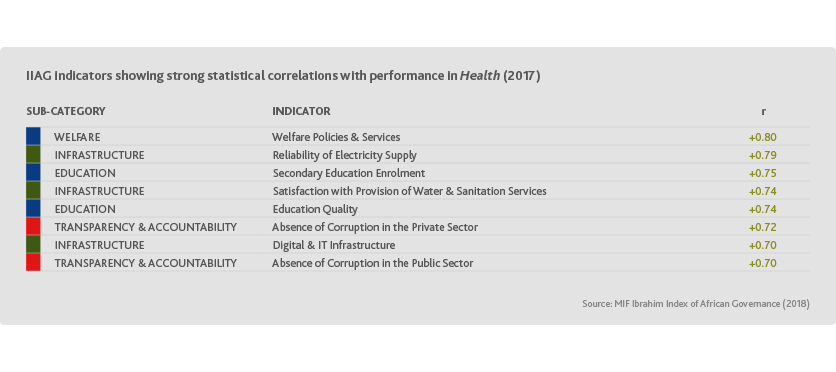
Prosperity and economic opportunity
For prosperity and economic opportunity, the report highlights that many countries lag far behind in economic diversification. The IIAG indicator that serves as a proxy for this is on average the worst performing of over 100 governance indicators.
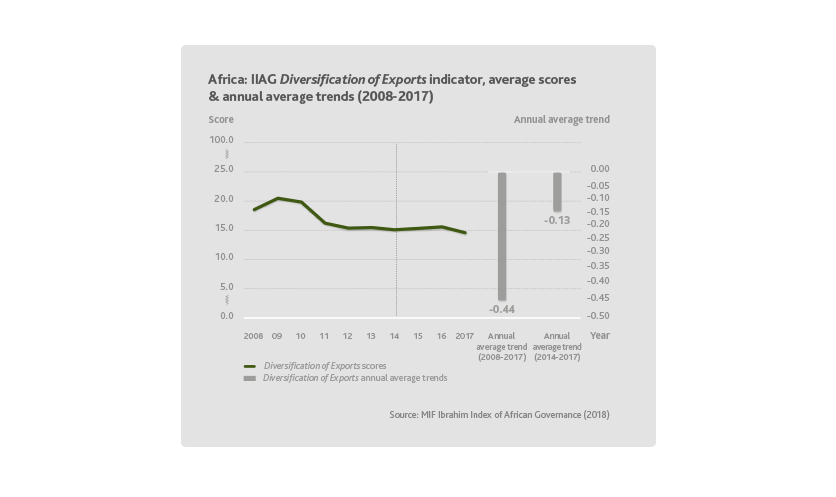
Governments and partners should look at diversifying economies, and also accelerating progress in infrastructure – specifically physical transport, electricity and ICT – as well as increasing investment in the rural sector and strengthening regional integration to make efficient progress.
The measurability of the Agendas
The report also highlights that African countries face enormous challenges both in terms of working on the measurability of the targets of the Agendas and developing the statistical capacity required to collect enough data to measure those targets.
There are two key findings. The first is that sometimes targets or indicators are not easily measurable, and the second is that when they are, there is a lack of data.
For example, of the 255 targets of Agenda 2063 just over half (52.2%) could be, in theory, quantifiable at the country level, but so far only 63 core indicators have been developed to measure Agenda 2063 targets – under 20%.
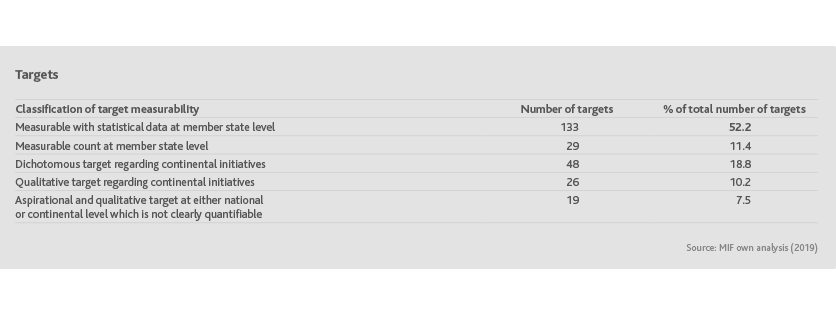
The SDG indicators are currently more quantifiable, but the 2017 Sustainable Development Report highlighted that only six of the 17 Goals have more than half of their indicators with coverage for African countries. Four of the 17 goals have less than 15% of their indicators with coverage for African countries. Where there is data, over half of the data source types on Africa are estimations, modelling, or global monitoring.
In Africa: data availability and statistical capacity remain a challenge
Governmental statistical capacity has slightly improved on average in recent years, but there are some stark findings on data availability and trends, and these are fundamental to the achievement of the Agendas.
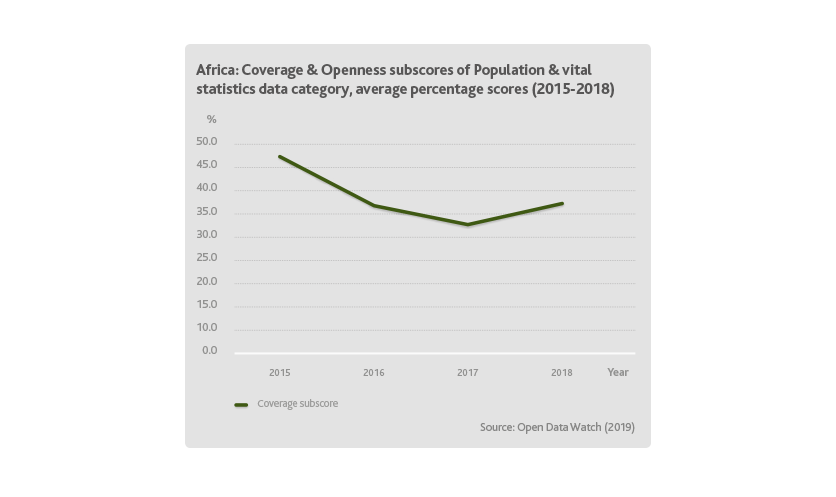
Since adoption of both Agendas, assessments done by Open Data Watch show that the coverage of publicly available data in Africa has on average declined for social, economic and financial statistics. One of the most deteriorated data sub-categories in this assessment is the coverage of population and vital statistics.
Improving civil registration is a vital step in assessing targets of the Agendas, ensuring no one is left behind. However, according to the Coverage of Birth and Death Registration dataset from UNStats, of the 42 African countries with their latest observation being in the last ten years of available data (2009-2018), only eight have a birth registration system with a coverage rate higher than 90%.
Furthermore, of the 16 African countries with data on death registration coverage, only three have a death registration system that covers 90% or more of the population. The paucity of such vital data is in striking contrast with population growth – Africa is expected to be home to 1.68 billion people by 2030. A civil registration system is a critical element for establishing the legal identity of individuals, providing them with access to public services and securing basic human rights.
Strengthening National Statistical Offices (NSOs) is therefore key. The report highlights that NSOs need robust strategies, funding, and importantly, independence and autonomy.


